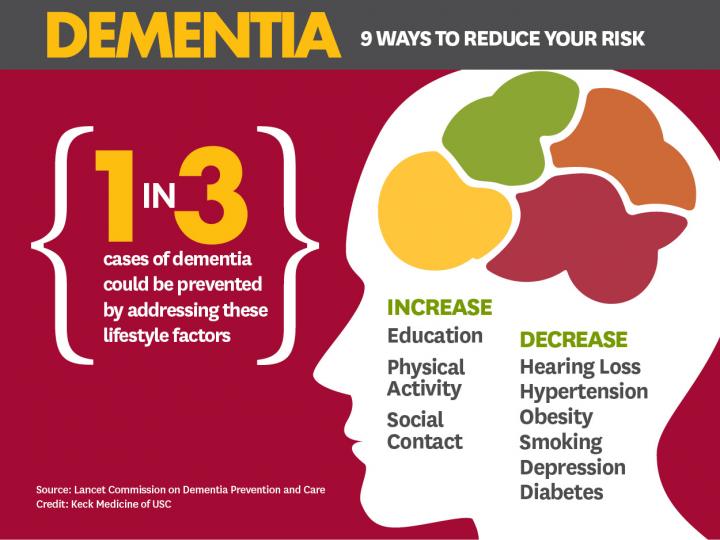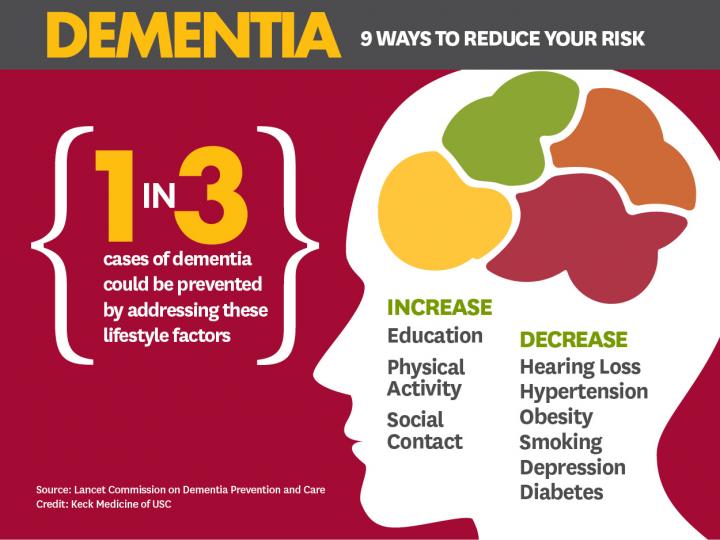
Credit: Keck Medicine of USC
LOS ANGELES – Managing lifestyle factors such as hearing loss, smoking, hypertension and depression could prevent one-third of the world's dementia cases, according to a report by the first Lancet Commission on Dementia Prevention and Care. Presented at the Alzheimer's Association International Conference (AAIC) 2017 and published in The Lancet, the report also highlights the beneficial effects of nonpharmacologic interventions such as social contact and exercise for people with dementia.
"There's been a great deal of focus on developing medicines to prevent dementia, including Alzheimer's disease," says commission member and AAIC presenter Lon Schneider, MD, professor of psychiatry and the behavioral sciences at the Keck School of Medicine of USC. "But we can't lose sight of the real major advances we've already made in treating dementia, including preventive approaches."
The commission brought together 24 international experts to systematically review existing research and provide evidence-based recommendations for treating and preventing dementia. About 47 million people have dementia worldwide and that number is expected to climb as high as 66 million by 2030 and 115 million by 2050.
Reducing dementia risk, beginning in childhood
The commission's report identifies nine risk factors in early, mid- and late life that increase the likelihood of developing dementia. About 35 percent of dementia — one in three cases — is attributable to these risk factors, the report says.
By increasing education in early life and addressing hearing loss, hypertension and obesity in midlife, the incidence of dementia could be reduced by as much as 20 percent, combined.
In late life, stopping smoking, treating depression, increasing physical activity, increasing social contact and managing diabetes could reduce the incidence of dementia by another 15 percent.
"The potential magnitude of the effect on dementia of reducing these risk factors is larger than we could ever imagine the effect that current, experimental medications could have," Schneider says. "Mitigating risk factors provides us a powerful way to reduce the global burden of dementia."
A nonpharmacologic approach to treating dementia
The commission also examined the effect of nonpharmacologic interventions for people with dementia and concluded that they had an important role in treatment, especially when trying to address agitation and aggression.
"Antipsychotic drugs are commonly used to treat agitation and aggression, but there is substantial concern about these drugs because of an increased risk of death, cardiovascular adverse events and infections, not to mention excessive sedation," Schneider says.
The evidence showed that psychological, social and environmental interventions such as social contact and activities were superior to antipsychotic medications for treating dementia-related agitation and aggression.
The commission also found that nonpharmacologic interventions like group cognitive stimulation therapy and exercise conferred some benefit in cognition as well.
The commission's full report provides detailed recommendations in the areas of prevention, treating cognitive symptoms, individualizing dementia care, caring for caregivers, planning for the future following a dementia diagnosis, managing neuropsychiatric symptoms and considering the end of life.
###
ABOUT THE KECK SCHOOL OF MEDICINE OF USC
Founded in 1885, the Keck School of Medicine of USC is among the nation's leaders in innovative patient care, scientific discovery, education, and community service. It is part of Keck Medicine of USC, the University of Southern California's medical enterprise, one of only two university-owned academic medical centers in the Los Angeles area. This includes the Keck Medical Center of USC, composed of the Keck Hospital of USC and the USC Norris Cancer Hospital. The two world-class, USC-owned hospitals are staffed by more than 500 physicians who are faculty at the Keck School. The school today has approximately 1,650 full-time faculty members and voluntary faculty of more than 2,400 physicians. These faculty direct the education of approximately 800 medical students and 1,000 students pursuing graduate and post-graduate degrees. The school trains more than 900 resident physicians in more than 50 specialty or subspecialty programs and is the largest educator of physicians practicing in Southern California. Together, the school's faculty and residents serve more than 1.5 million patients each year at Keck Hospital of USC and USC Norris Cancer Hospital, as well as USC-affiliated hospitals Children's Hospital Los Angeles and Los Angeles County + USC Medical Center. Keck School faculty also conduct research and teach at several research centers and institutes, including the USC Norris Comprehensive Cancer Center, the Zilkha Neurogenetic Institute, the Eli and Edythe Broad Center for Stem Cell Research and Regenerative Medicine at USC, the USC Cardiovascular Thoracic Institute, the USC Roski Eye Institute and the USC Institute of Urology.
In 2017, U.S. News & World Report ranked Keck School of Medicine among the Top 40 medical schools in the country.
For more information, go to keck.usc.edu.
Media Contact
Meg Aldrich
[email protected]
323-442-3941
@keckmedusc
Keck Home
Related Journal Article
http://dx.doi.org/10.1016/S0140-6736(17)31363-6





